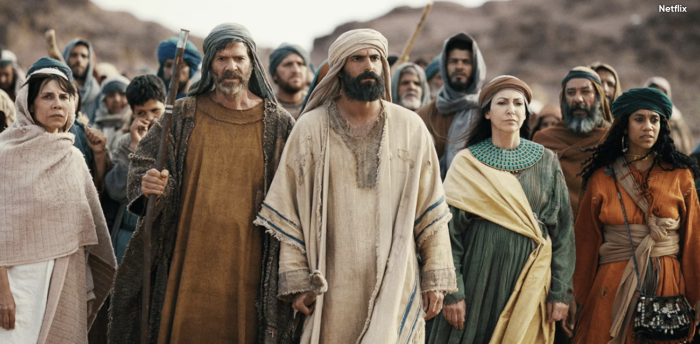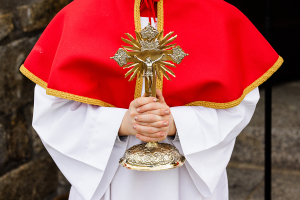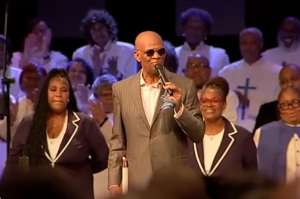Netflix series 'Testament: The Story of Moses' seeks to remove 'superhuman' stigma around Moses: creators

Netflix's latest faith-based docudrama, “Testament: The Story of Moses,” seeks to shed light on the inner life and personal struggles of the iconic biblical figure — elements often overshadowed in traditional retellings of his story — in an effort to spark meaningful conversations about the human condition, according to showrunners.
“I think of ‘Prince of Egypt’ or ‘Ten Commandments,’ and those are all great films, but it seems like Moses is almost presented as superhuman,” Kelly McPherson, executive producer of the series, told The Christian Post.
“Put yourself in his shoes; there's a burning bush and it tells you to go do something which is virtually impossible to do. We liked the idea of, ‘How did he find the wherewithal to do this?’ Obviously, he was inspired by God, but how did he find the courage to do this? We liked the fact that he was a person with flaws; he had to overcome a lot and what was, by many accounts, a tragic childhood. We liked making him more human. He does things that are super heroic, yes, but there was a side of him that was very, very human and very, very flawed at the same time.”
“There's the epic, there's the big scale, there's all that side of it, but then what's the human side? What was that experience like? That’s what we wanted to examine,” added Executive Producer Emre Sahin.
The three-part docuseries, narrated by Charles Dance, features perspectives from Muslims and Christian leaders, along with Jewish rabbis and experts, to delve into the background and history of Moses.
“Most of the accounts were more similar than what we thought from different faith backgrounds,” McPherson told CP. “But we really tried to let Moses' motivations drive the story … he kind of transcends any one religion or set of beliefs. He's beloved by all these different religions.”
The initial episode, titled "The Prophet," delves into Moses' early life as an Egyptian prince and his subsequent journey to the land of Midian following the killing of an Egyptian taskmaster. In "The Plagues," viewers witness Moses' efforts to persuade Pharaoh to release the Hebrews and the series of calamities unleashed by God upon the stubborn ruler. The third episode, titled "The Promised Land," focuses on events leading up to Moses' bestowal of the Ten Commandments.
Woven throughout the narrative are dramatizations of the Old Testament hero’s life, including the biblical accounts of how he killed an Egyptian taskmaster and fled, his encounter with the burning bush, the occasion in which he threw down his staff, turning it into a snake, and his relationship with his wife Zipporah.
Though the perspectives of various religions are shown throughout the series, Moses’ connection to the coming Christ is mentioned throughout, most frequently by Tom Kang, lead pastor NewStory Church in Los Angeles.
In one scene of the series, as Israelite families are shown covering their doorposts with blood, viewers are enlightened about its significance for Christians. It symbolizes a foreshadowing of the New Testament and Jesus Christ, representing the concept of the sacrificial lamb and salvation through His blood.
Similarly, during the depiction of the Israelites crossing the Red Sea, an expert on-screen clarifies that the Bible portrays it as a miraculous act of God, distinct from any natural explanation.
The creators said they uncovered surprising elements of Moses' story throughout their research. McPherson said he grew up attending a Baptist church but said many facets of Moses’ life surprised him: “He really had everything going against him as an underdog, including being a fugitive, and that makes his journey all the more dramatic and inspiring," he said.
The dynamics of Moses' relationship with God also intrigued the creators. Producers highlighted their exploration of the intimate, nuanced exchanges between Moses and God, challenging common misconceptions about their interaction.
“One expert who’s written a biography of Moses and then a Christian pastor shared with us how they’re really still intrigued by Moses relationship with God,” McPherson said. “One of them said, half-jokingly, ‘Sometimes they would bicker with each other like an old married couple.’ We really liked the fact that Moses had these real dialogues with God, and they would intensify. It doesn't mean they're at odds, it just means that they had this intimate relationship ... that was the centerpiece of the whole thing.”
“I'm not saying they were equals,” he added, “but there was this give and take in their conversations. I was really fascinated to learn that because I never had thought of that relationship in that way.”
McPherson noted, for example, that in Exodus 32:14, Moses changes God’s mind: “God is fed up with the Israelites after the idols and everything, and He’s like, ‘We’re going to start over.’ Moses talks Him out of it. I think that's something that a lot of people might not realize, there was a back and forth, and God listened to Moses, just like Moses listened to God," he said.
“Testament: The Story of Moses” comes amid a renewed interest in faith-based projects, and particularly those dramatizing biblical stories, as demonstrated by the success of “The Chosen.”
“Bible stories are some of the most amazing stories ever told, and they're archetypes for all stories, even in the secular world,” McPherson said. “They're the basis for so many of the stories that people tell … we wanted people to be drawn in and moved and entertained, but we also wanted the story to be inspiring.”
Sahin added that throughout history, people revisit Bible stories to seek understanding, interpretation and inspiration, especially during times of societal or personal upheaval.
“Bible stories are the foundation of so much of humanity and society,” he said. “We go through chapters in humanity and each successive one tries to understand, interpret or be inspired by Bible stories. I think we’re going through another one of those right now, whether that's triggered by kind of a state of the world or a growing movement.
Through these stories, we also understand the world we live in better and ourselves. We're at one of those periods where we're all seeking meaning in the life we're living … and [the Bible] is one of the first places you turn to, trying to find meaning in these stories, meaning in our own lives.”
“Testament: The Story of Moses" launches on Netflix on March 27.
Leah M. Klett is a reporter for The Christian Post. She can be reached at: leah.klett@christianpost.com




























